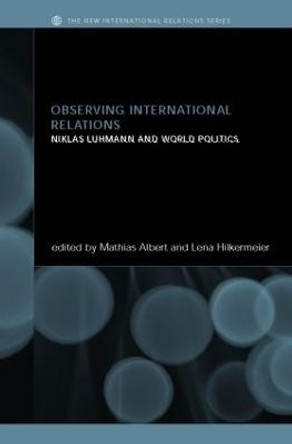Description
This book provides an innovative analysis, using sociological theory to examine world politics as a differentiated social realm.
About the Author
Mathias Albert is Professor of Political Science at Bielefeld University. He has written, co-authored or edited numerous books and written or co-authored about one hundred and thirty articles and chapters. Among his books are Zur Politik der Weltgesellschaft (2002), Identities, Borders, Orders (2001, edited with David Jacobson and Yosef Lapid) and New Systems Theories of International Relations (2010, edited with Lars-Erik Cederman and Alexander Wendt). Work in progress includes A Theory of World Politics. Barry Buzan is Emeritus Professor of International Relations at the London School of Economics and Political Science (formerly Montague Burton Professor), and honorary professor at Copenhagen and Jilin Universities. In 1998 he was elected a Fellow of the British Academy. He has written, co-authored or edited over twenty books, written or co-authored more than one hundred and thirty articles and chapters, and lectured, broadcast or presented papers in over twenty countries. Among his books are: People, States and Fear: The National Security Problem in International Relations (1983, revised 2nd edition 1991); The Logic of Anarchy: Neorealism to Structural Realism (1993, with Charles Jones and Richard Little); Security: A New Framework for Analysis (1998, with Ole Waever and Jaap de Wilde); International Systems in World History: Remaking the Study of International Relations (2000, with Richard Little); Regions and Powers: The Structure of International Security (2003, with Ole Waever); From International to World Society? English School Theory and the Social Structure of Globalisation (2004); The Evolution of International Security Studies (2009, with Lene Hansen) and Non-Western International Relations Theory (2010, co-edited with Amitav Acharya). Work in progress includes The Global Transformation: The 19th Century and the Making of Modern International Relations (2013, with George Lawson). Michael Zurn is Professor of Political Science at Free University Berlin and Director of the research unit 'Transnational Conflicts and International Relations' at the Social Science Research Center, Berlin. He was founding Dean of the Hertie School of Governance in Berlin (2004-9) and is a member of the Berlin-Brandenburg Academy of Science. Michael Zurn's research focuses on international institutions and organizations and their repercussions for the foundations of political order. He is concerned especially with questions of the emergence of international regimes, as well as with issues related to the effectiveness of those regimes and compliance with the regulatory systems which they establish. Latest book publications include Handbook on Multi-Level Governance (co-edited with Hendrik Enderlein and Sonja Waltli, 2010) and Rule of Law Dynamics: In an Era of International and Transnational Governance (co-edited with Andre Noellkaemper and Randall Peerenboom, Cambridge, 2012).
Book Information
ISBN 9781107039001
Author Mathias Albert
Format Hardback
Page Count 292
Imprint Cambridge University Press
Publisher Cambridge University Press
Weight(grams) 570g
Dimensions(mm) 235mm * 158mm * 20mm






